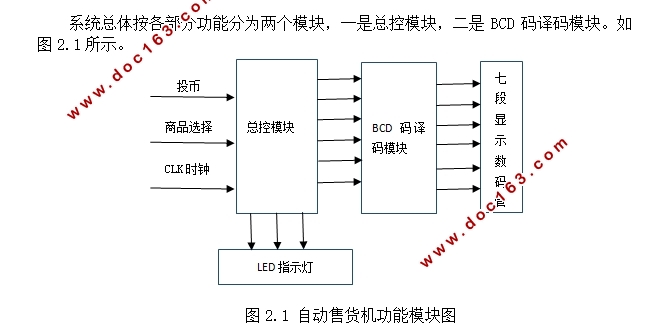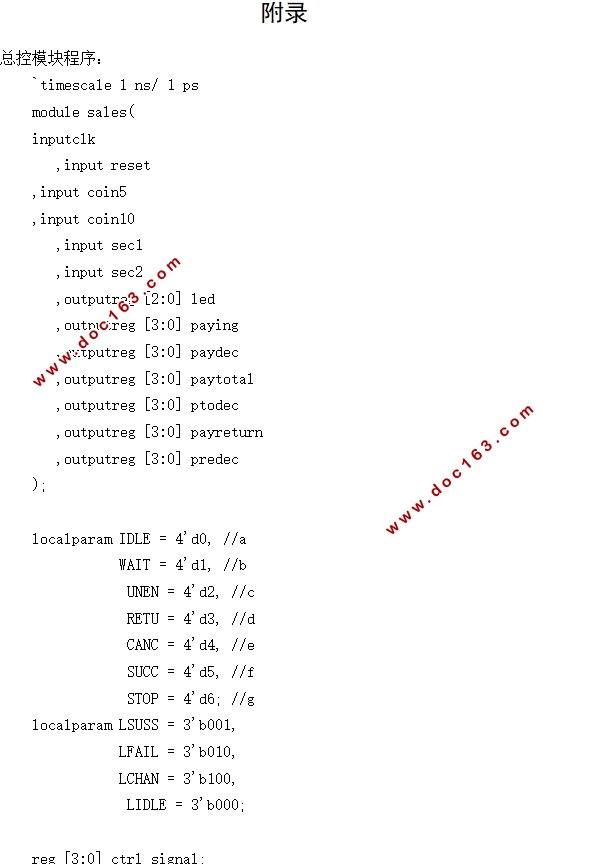基于EDA的自动售货机设计

基于EDA的自动售货机设计(任务书,开题报告,论文13300字)
摘要
自动售货机是一种能识别投入的货币并售卖商品的商业化机器,因其便捷性和全天候工作的特性而得到人们的喜爱,并被广泛投放于公共场所进行使用。本文先对自动售货机的硬件、描述语言、开发环境方面进行方案选择;即在EDA工具quartus2中,基于FPGA使用Verilog HDL语言对系统进行设计。在总控模块中使用三段式法对状态机进行设计,实现系统中各工作状态之间的跳转,并使系统的输出稳定;同时用高电平检测程序对投币信号进行处理,只选取第一个周期作为有效信号,加快系统反应速度。再通过数码管真值表对应系统的输入输出关系并设计出BCD码译码模块,使其能通过数码管进行显示。最后将总控模块和BCD码译码模块连接在一起得到的总程序进行编译后,再使用quartus外接的modelsim软件进行仿真,得到相应结果。
关键词:EDA、quartus2、FPGA、Verilog、状态机
Abstract
The vending machine is a kind of commercial machine that can identify the input currency and sell goods. It is popular with people because of its convenience and characteristics of all-weather work, and is widely used in public places. In this paper, the hardware, description language and development environment of the vending machine are selected firstly. That is, in the EDA tool quartus2, the system is designed based on FPGA using Verilog HDL language. The three-stage method is used in the master control module to design the state machine to realize the jump between the various working states in the system and to make the system output stable. At the same time, the high level detection program is used to process the coin signal, only Select the first cycle as a valid signal to speed up the system response. Then through the digital tube truth table corresponding to the system's input and output relations and design a BCD code decoding module, so that it can be displayed through the digital tube. Finally, the total program obtained by connecting the master control module and the BCD code decoding module is compiled, and then the modelsim software of quartus is used for simulation to obtain the corresponding result.
KeyWords:EDA、quartus2、FPGA、Verilog、State Machine
[版权所有:http://DOC163.com]


目录
摘要 I
Abstract II
第1章绪论 1
1.1 背景 1
1.2 目的和意义 1
1.3 国内外研究现状 2
第2章系统结构设计与方案选择 3
2.1 系统结构 3
2.1.1 自动售货机主要功能 3
2.1.2 系统的模块划分 3
2.1.3 系统流程图 3
2.2 方案设计 4
2.2.1 硬件选择 4
2.2.2 硬件描述语言选择 5 [来源:http://Doc163.com]
2.2.3 设计环境选择 6
2.3 小结 8
第3章自动售货机的设计及仿真 9
3.1 自动售货机总控模块设计 9
3.1.1 状态机 9
3.1.2 状态机设计 10
3.1.3 内部算法设计 12
3.1.4 总控模块仿真 13
3.2 BCD码译码模块 16
3.3 系统设计与仿真 18
3.4 小结 21
第4章总结 22
致谢 23
参考文献 24
附录 25
[版权所有:http://DOC163.com]
